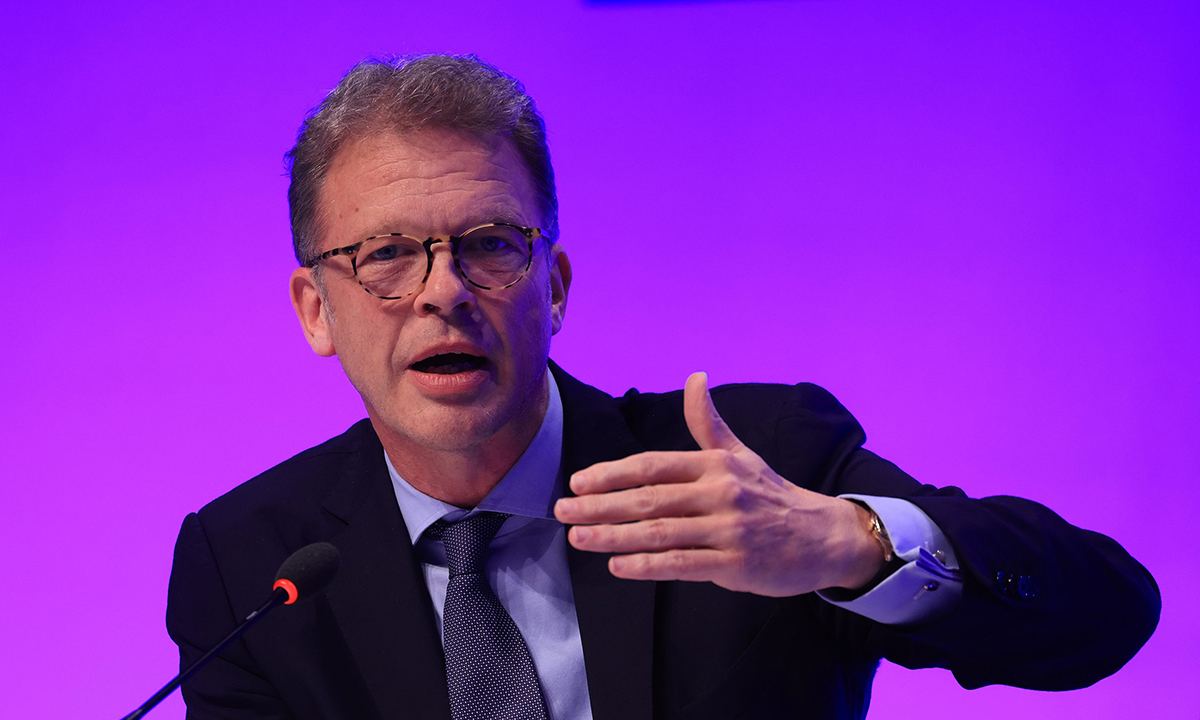
去年4月,俄乌冲突爆发一个月后,德意志银行(Deutsche Bank)成为第一家预测美国陷入经济衰退的大型投资银行。不到一个月后,该银行的经济学家在该预测的基础上进一步表示,由于加息和恶性通胀,美国可能到2023年底或2024年第一季度进入“严重衰退”。
但之后,尽管始终面临阻力,美国经济依旧表现出出人意料的韧性。5月的失业率为3.7%,一直维持在接近疫情之前的最低水平,第一季度GDP增长了1.1%。股市经历过低迷的2022年之后也开始火爆,随着人工智能吸引了投资者的关注,标普500指数从年初至今上涨超过12%。
尽管有最近的各种好消息,德意志银行的智库依旧认为,经过美联储历史性的政策调整之后,经济衰退不可避免。
德意志银行全球经济学与主题研究总监吉姆·里德和首席经济学家大卫·福尔克兹-兰道在周一发布的一份研究报告中表示:“由于2020年至2021年美国大量增加货币供应、不受控制的高通胀和激进的政策响应,美国即将进入四十年来第一次真正因政策导致的繁荣-萧条周期。下一个阶段,美国将陷入我们在去年早些时候最先预测的经济衰退。”
自全球金融危机爆发后的十多年来,美联储为了刺激经济增长,一直执行近零利率和量化宽松政策,为了增加货币供应和刺激借贷和投资,美联储会购买债券和抵押贷款担保证券。疫情爆发后,他们加大了所谓“低息贷款”政策的执行力度,以避免发生经济灾难。但里德和福尔克兹-兰道认为,这一举措将美国拖入了灾难性的通货膨胀和繁荣-萧条周期。
德意志银行认为,2021年,美联储的低息贷款政策以及供应链中断和经济刺激计划,加剧了通货膨胀,迫使美联储官员只能选择加息,在15个月内从近零利率提高到5%至5.25%的区间。里德和福尔克兹-兰道认为激进的大幅加息导致的借款成本上涨,令消费者和企业难以应对。
他们写道:“经过10至15年零利率或负利率和几乎从未中止的量化宽松政策之后,企业、消费者和投资者无法完全适应近期的利率冲击。”他们认为,随着利率上浮,将会发生更多金融“事故”,类似于今年3月美国硅谷银行(Silicon Valley Bank)等多家区域性银行的倒闭。
他们解释称,再发生一场金融事故可能导致贷款进一步减少,打击投资者最近因为人工智能有所提升的“动物本能”,进而加快经济衰退和市场下行。英国知名经济学家约翰·梅纳德·凯恩斯在1936年创造了“动物本能”(animal spirits)一词,用来形容投资者和消费者尤其在近期内,会受到情绪而不是逻辑的驱动,这可能导致他们因为糟糕的经济数据陷入恐慌。
里德和福尔克兹-兰道还认为,为了应对除波动性的食品和能源价格以外的核心通胀,美联储可能不得不再加息三次。美联储最常用的衡量核心通胀的指标是个人消费支出(PCE)指数。从3月至4月,个人消费支出指数上涨0.4%,远高于前一个月0.1%的涨幅。4月的物价同比上涨4.4%,高于3月的4.2%。
他们表示:“事实证明,核心通胀过高,令人感到不安。或许只有经济衰退的环境,才能将核心通胀降低到目标水平。”
虽然一些投行认为,当前强劲的劳动力市场可以避免美国经济陷入严重衰退,但福尔克兹-兰道和里德指出,许多银行预测经济衰退使用的财务模型并非一直可靠,这意味着消费者和投资者应该保持警惕。
他们写道:“预测经济衰退存在的问题是,基于模型的预测很少能够做到提前预测。在极少数能够预测经济衰退的情况中,轻度衰退通常是模型可以生成的最糟糕的情况。因此如果美国经济硬着陆,不要指望模型能够提前预测。”(财富中文网)
翻译:刘进龙
审校:汪皓
去年4月,俄乌冲突爆发一个月后,德意志银行(Deutsche Bank)成为第一家预测美国陷入经济衰退的大型投资银行。不到一个月后,该银行的经济学家在该预测的基础上进一步表示,由于加息和恶性通胀,美国可能到2023年底或2024年第一季度进入“严重衰退”。
但之后,尽管始终面临阻力,美国经济依旧表现出出人意料的韧性。5月的失业率为3.7%,一直维持在接近疫情之前的最低水平,第一季度GDP增长了1.1%。股市经历过低迷的2022年之后也开始火爆,随着人工智能吸引了投资者的关注,标普500指数从年初至今上涨超过12%。
尽管有最近的各种好消息,德意志银行的智库依旧认为,经过美联储历史性的政策调整之后,经济衰退不可避免。
德意志银行全球经济学与主题研究总监吉姆·里德和首席经济学家大卫·福尔克兹-兰道在周一发布的一份研究报告中表示:“由于2020年至2021年美国大量增加货币供应、不受控制的高通胀和激进的政策响应,美国即将进入四十年来第一次真正因政策导致的繁荣-萧条周期。下一个阶段,美国将陷入我们在去年早些时候最先预测的经济衰退。”
自全球金融危机爆发后的十多年来,美联储为了刺激经济增长,一直执行近零利率和量化宽松政策,为了增加货币供应和刺激借贷和投资,美联储会购买债券和抵押贷款担保证券。疫情爆发后,他们加大了所谓“低息贷款”政策的执行力度,以避免发生经济灾难。但里德和福尔克兹-兰道认为,这一举措将美国拖入了灾难性的通货膨胀和繁荣-萧条周期。
德意志银行认为,2021年,美联储的低息贷款政策以及供应链中断和经济刺激计划,加剧了通货膨胀,迫使美联储官员只能选择加息,在15个月内从近零利率提高到5%至5.25%的区间。里德和福尔克兹-兰道认为激进的大幅加息导致的借款成本上涨,令消费者和企业难以应对。
他们写道:“经过10至15年零利率或负利率和几乎从未中止的量化宽松政策之后,企业、消费者和投资者无法完全适应近期的利率冲击。”他们认为,随着利率上浮,将会发生更多金融“事故”,类似于今年3月美国硅谷银行(Silicon Valley Bank)等多家区域性银行的倒闭。
他们解释称,再发生一场金融事故可能导致贷款进一步减少,打击投资者最近因为人工智能有所提升的“动物本能”,进而加快经济衰退和市场下行。英国知名经济学家约翰·梅纳德·凯恩斯在1936年创造了“动物本能”(animal spirits)一词,用来形容投资者和消费者尤其在近期内,会受到情绪而不是逻辑的驱动,这可能导致他们因为糟糕的经济数据陷入恐慌。
里德和福尔克兹-兰道还认为,为了应对除波动性的食品和能源价格以外的核心通胀,美联储可能不得不再加息三次。美联储最常用的衡量核心通胀的指标是个人消费支出(PCE)指数。从3月至4月,个人消费支出指数上涨0.4%,远高于前一个月0.1%的涨幅。4月的物价同比上涨4.4%,高于3月的4.2%。
他们表示:“事实证明,核心通胀过高,令人感到不安。或许只有经济衰退的环境,才能将核心通胀降低到目标水平。”
虽然一些投行认为,当前强劲的劳动力市场可以避免美国经济陷入严重衰退,但福尔克兹-兰道和里德指出,许多银行预测经济衰退使用的财务模型并非一直可靠,这意味着消费者和投资者应该保持警惕。
他们写道:“预测经济衰退存在的问题是,基于模型的预测很少能够做到提前预测。在极少数能够预测经济衰退的情况中,轻度衰退通常是模型可以生成的最糟糕的情况。因此如果美国经济硬着陆,不要指望模型能够提前预测。”(财富中文网)
翻译:刘进龙
审校:汪皓
In April of last year, just a month after Russia’s invasion of Ukraine, Deutsche Bank became the first major investment bank to predict a U.S. recession. Less than a month later, its economists upped the ante on their forecast, arguing that a “major recession” would hit by the end of 2023 or the first quarter of 2024 due to rising interest rates and stubborn inflation.
But since then, the economy has remained surprisingly resilient even amid consistent headwinds. The unemployment rate stuck near pre-pandemic lows at 3.7% in May and GDP jumped 1.1% in the first quarter. The stock market is also on fire after a dismal 2022, with the S&P 500 rising more than 12% year to date as investors flock to A.I. plays.
Still, despite the recent positive news, Deutsche Bank’s top minds continue to believe a recession is inevitable after the Federal Reserve’s historic policy shift.
“The U.S. is on track for its first genuine policy-led boom-bust cycle in four decades, induced by a significant increase in the money supply over 2020–21, unleashing high inflation and an aggressive policy response,” Deutsche Bank’s head of global economics and thematic research, Jim Reid, and chief economist, David Folkerts-Landau, wrote in a Monday research note. “The next stage is the U.S. recession that we were the first to forecast early last year.”
For more than a decade after the Global Financial Crisis, Fed officials sought to boost economic growth by holding interest rates near zero and instituting a policy called quantitative easing (QE)—where they would buy government bonds and mortgage-backed securities in order to increase the money supply and spur lending and investment in the economy. When the pandemic hit, they doubled down on these so-called “easy money” policies to help prevent an economic disaster. But Reid and Folkerts-Landau argue that this move set the U.S. up for a disastrous spell of inflation and a boom-bust cycle.
The easy money policies of the Fed, along with broken supply chains and stimulus programs, helped exacerbate the rise of inflation in 2021, according to Deutsche Bank, and forced Fed officials to raise interest rates from near zero to a range between 5% and 5.25% over the past 15 months. Reid and Folkerts-Landau argue that consumers and businesses are struggling to cope with the rising borrowing costs that have come with these aggressive rate hikes.
“After 10–15 years of zero/negative rates and near continuous QE, businesses, consumers and investors are a long way from fully adjusting to the recent rate shock,” they wrote, arguing more financial “accidents” like what happened with U.S. regional banks in March, when Silicon Valley Bank and several others collapsed, “remain a big risk” as interest rates rise.
The pair explained that another financial accident would lead to a further reduction in lending and crush the “animal spirits” of investors that have been lifted by A.I. of late, thereby accelerating a recession and market downturn. The renowned British economist John Maynard Keynes coined the term “animal spirits” in 1936 to describe how investors and consumers are often driven by emotion rather than logic, particularly in the near term, which can lead them to be spooked by bad economic data.
Reid and Folkerts-Landau also believe the Fed could be forced to raise interest rates up to three more times in order to fight core inflation, which excludes volatile food and energy prices. The Fed’s favorite gauge of core inflation, the personal consumption expenditures (PCE) index, rose 0.4% from March to April, much higher than its 0.1% rise the previous month. And year over year, prices were up 4.4% in April, compared to 4.2% in March.
“Core inflation is proving too high for comfort and recessionary conditions may be the only way of returning it to target,” they wrote.
While some investment banks now argue that the strong labor market will prevent a major recession from hitting the U.S. economy, Folkerts-Landau and Reid pointed out that the financial models many banks use to predict recessions aren’t always reliable—which means consumers and investors should be on guard.
“The problem with predicting recessions is that model-based forecasts rarely predict them in advance,” they wrote. “On the rare occasions where recessions are predicted, mild downturns tend to be the worst that models can generate. So if we do get a hard landing, don’t expect models to predict it in advance.”






